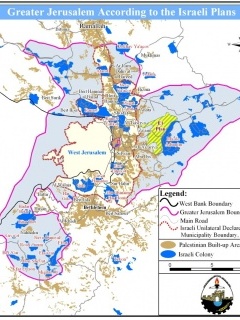FOR IMMEDIATE RELEASE
Contact Information: Hussein Ibish
March 23, 2009 - 12:00am
Washington, DC, March 23 – The American Task Force on Palestine (ATFP) today expressed deep concern about a series of recent Israeli actions regarding Jerusalem that pose a serious threat to a peaceful future between Israel and the Palestinians. ATFP’s most recent expression of concern was prompted by Israel’s blocking of a cultural festival last weekend organized by the Palestinian Authority declaring Jerusalem “the capital of Arab culture for 2009.” Israeli occupation authorities reportedly prevented eight separate events from going forward, arrested 20 people accused of organizing them and disrupted activities such as handing out tee-shirts promoting the celebrations and participating in a soccer match.
ATFP noted with great concern the numerous reported Israeli government plans for major settlement expansions in the occupied West Bank, especially in and around East Jerusalem. On March 2 the Israeli NGO Peace Now reported that various plans in several Israeli ministries would, if carried out, result in a large expansion of the Israeli settler presence in the occupied territories, including potentially doubling the size of settlement blocs such as Maale Adumim, Givat Ze'ev, Efrat, Geva Benyamin and Ariel. This would seriously call into question the credibility and viability of end-of-conflict negotiations to create a Palestinian state to live alongside Israel in peace and security. ATFP has repeatedly expressed alarm about such plans, particularly the so-called E-1 area settlement expansion plans that threaten to cut off Arab East Jerusalem from the rest of the West Bank.
ATFP also reiterated its concerns regarding Israeli government plans to demolish 88 Palestinian homes housing some 1,500 people in East Jerusalem Israel claims were constructed without required permissions from occupation authorities. The homes are located in the al–Bustan neighborhood of the Silwan area, the last largely Palestinian community adjacent to the south eastern walls of Islam's third holiest site of the al–Aqsa Mosque and the Dome of the Rock. Palestinians point out that Israel routinely withholds needed construction permits to Palestinian families, especially in occupied East Jerusalem.
Secretary of State Hillary Clinton also expressed concerns about the planned demolitions, saying, “Clearly this kind of activity is unhelpful and not in keeping with the obligations entered into under the ‘road map.’” The State Department has asked Israel for a detailed explanation of the legal basis for the planned demolitions, while Israel insists that this is an “internal” affair and says that the residents must be relocated to make way for the expansion of a planned archaeological park.
In addition, in late February Israel cut off more than 60,000 Palestinian Jerusalemites from direct access to the city by closing the only entry point to the city from the al–Ram and Dahiyat al–Barid neighborhoods. Earlier this month 55 Palestinian houses were scheduled to be demolished in the Shufat refugee camp on the northern outskirts of East Jerusalem.
ATFP President Ziad Asali said, “everyone who is serious about achieving an end-of-conflict agreement between Israel and the Palestinians understands that the capital of a Palestinian state must be in Arab East Jerusalem. These actions by the Israeli government undermine the hope that such an agreement can ever be reached and weaken both the viability and credibility of negotiations. They send an extremely damaging message to the Palestinian and Arab peoples regarding Israel’s seriousness about ever reaching a reasonable agreement.” “We are also deeply concerned,” he continued, “that through such provocative actions in and around Jerusalem, the Israeli government is undermining the sense in the Muslim world that the Palestinian leadership can be entrusted to secure Arab and Muslim rights regarding Jerusalem. This opens the disturbing possibility that the conflict will develop an increasingly religious character centered around Jerusalem pitting the Islamic world in general against Israel and bypassing the Palestinian national interest altogether. Such a conflict would be infinitely more difficult to resolve.” Dr. Asali concluded, “we urge the Israeli government to recognize how damaging such actions are and to avoid any further steps that prejudice the future of East Jerusalem, and we ask the US government to use all its influence with Israel to prevent these measures from going forward.”
TAGS:

















